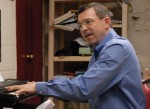Column Name
Title
What does a working composer do? With our focus on composition this month, we put that question to faculty member Thomas Cabaniss, who came to Juilliard in 1998; he teaches Music Studies for the dancers, a Music Theory elective in contemporary music, and a class in Arts Education. The Charleston, S.C., native, who got his bachelor’s in music from Yale, has also taught at Lincoln Center Institute, 92nd Street Y, New York Philharmonic, Philadelphia Orchestra, Metropolitan Opera, and Carnegie Hall. And he composes. “It’s been a big arranging year for me,” he says. “I did the expanded vocal arrangements for Carnegie Hall’s West Side Story, and I’m currently restoring and orchestrating a piece by early 20th-century Charleston composer Edmund Thornton Jenkins for Spoleto USA. Called Afram Ou La Belle Swita, it has its world premiere on June 4." Tom’s next new work of his own will be for faculty members and alums Michael and Jessica Shinn.
Body
How did you know you wanted to be a composer?
When I was 13, I performed in a musical written by Mel Marvin, a New York City composer originally from South Carolina. After the run of the show was over, I wrote my first song. I showed it to him, he helped me notate it, and I was hooked. I wrote a rock opera and two musicals before I finished high school, and I have been composing ever since. Mel now heads up the N.Y.U. Music Theater Graduate Program and we live two blocks away from each other!
Did you know you wanted to be a musician before you knew you wanted to compose?
No, I really wanted to be Tom Seaver, or pretty much anyone on the 1969 Mets. I started piano lessons comparatively late (age 11), and I liked playing by ear better than sight- reading. At about the same time, I played Louis Leonowens in a production of The King and I, and that made me want to be an actor. When I met Mel and realized that composers could be real, live people, everything changed.
What composition question do laymen ask most—and what are your answers?
How do you get your ideas? Mostly from reading.
How do you get a melody? Lots of vocal and keyboard improvisation.
How do you make a living? Work a lot.
What do composers ask each other— and what are your answers?
Do you use Sibelius or Finale? Finale, but that’s just because I’m old.
Where do you record? Second Story Sound in Chinatown.
How do you make a living? Same as above.
How do you know when you’re really done with a piece?
For me, it’s when I can sit and play the piece at the piano from beginning to end and be convinced by it.
What’s your ideal composing environment?
I work at home in our apartment in Morningside Heights, and it’s a pretty nice place to compose. But I also have a pipe dream: to design and build a composing studio next to a barn we own in Pound Ridge in northern Westchester.
If you weren’t in this career, what would you be doing?
In the fifth grade, I wanted to be an architect, and that would have been fun, too.
What are your nonmusic interests?
My main interest is my wife, a beautiful and brilliant psychoanalyst who directs psychotherapy training at Columbia University. Hobbies: I am the cook in our family, and I can spend a long time in the kitchen on weekend afternoons. I’m also an avid reader of and dabbler in poetry.
What are you reading/listening to/watching?
Poetry by Joseph Brodsky, Jack Gilbert, and Mary Oliver (her newest collection, Felicity). Anything new by Meredith Monk, John Adams, Caroline Shaw, or Kendrick Lamar. The films of Eric Rohmer. The New York Times food section, especially the videos by Melissa Clark and Mark Bittman.
What would people be surprised to know about you?
I play a mean melodica. I’m a member of an improvisatory vocal lab. I make a living.





